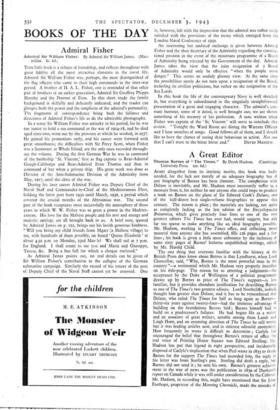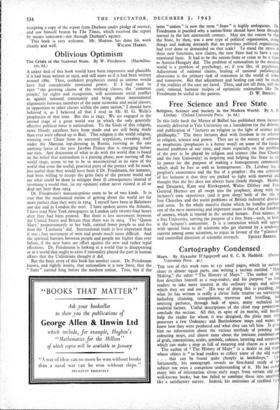A Great Editor
Thomas Barnes of The Times." By Derek Hudson. (Cambridge University Press. xos. 6d.)
APART altogether from its intrinsic merits, this book was badly needed, for the lack not merely of an adequate biography but of any biography of Barnes has been clamant. The comparison with Delane is inevitable, and Mr. Hudson must necessarily suffer in a measure from it, for neither he nor anyone else could hope to produce a book on Barnes on the plane of Sir Edward Cook's Delane, one of the half-dozen best single-volume biographies to appear this century. The reason is plain ; the materials are lacking, not quite as completely lacking as the last edition of the Encyclopaedia Britannica, which gives precisely four lines to one of the two greatest editors The Times has ever had, would suggest, but still far too sparse to make anything like an ideal biography possible. Mr. Hudson, working in The Times office, and collecting more material than anyone else has assembled, fills 126 pages and a few lines ; his book is given a little more substance by the inclusion of some sixty pages of Barnes' hitherto unpublished writings, edited by Mr. Harold Child.
The one thing that everyone familiar with the history of the British Press does know about Barnes is that Lyndhurst, when Lord Chancellor, said, " Why, Barnes is the most powerful man in the country "—a testimonial which Mr. Hudson very properly inscribes on his title-page_ The reason for so arresting a judgement—the acceptance by the Duke of Wellington of a political programme drawn up by Barnes as price of The Times's support—is less familiar, but it provides abundant justification for describing Barnes as one of The Times's two greatest editors. Lord Northcliffe, indeed, thought him greater than Delane, and it has to be remembered that Delane, who ruled The Times for half as long again as Barnes— thirty-six years against twenty-four--had the immense advantage of building on the foundations Barnes laid ; Barnes himself had to build on a predecessor's failures. He had begun life as a writer and an associate of great writers, notable among them Lamb and Leigh Hunt, and on assuming direction of The Times he still wrote, but it was leading articles now, and in strictest editorial anonymity. How frequently he wrote is difficult to determine ; Carlyle has encouraged the belief that throughout Barnes's tenure of office the real voice of Printing House Square was Edward Sterling; Mr. Hudson has put that legend in right perspective, and incidentally disposed of Carlyle's implication that when Peel wrote in 1835 to thank Barnes- for the support The Times had accorded him, the reply to his letter was from Sterling's pen. Sterling did draft a reply, but Barnes did not send it ; he sent his own. Barnes's greatest achieve- ment in the way of news was the publication in 1839 of Durham's report on Canada while it was still under consideration by the Cabinet Mr. Hudson, in recording this, might have mentioned that Sir John Easthope, proprietor of the Morning Chronicle, made the mistake of
accepting a copy of the report from Durham under pledge of secrecy, and saw himself beaten by The Times, which received the report by means unknown—not through Durham's agency. This -book is very welcome. Mr. Hudson has done his work



























 Previous page
Previous page